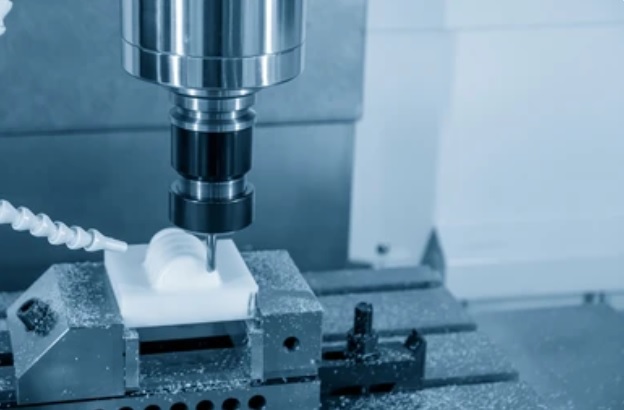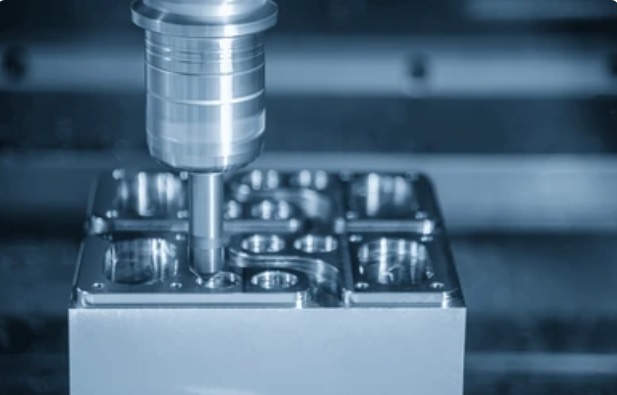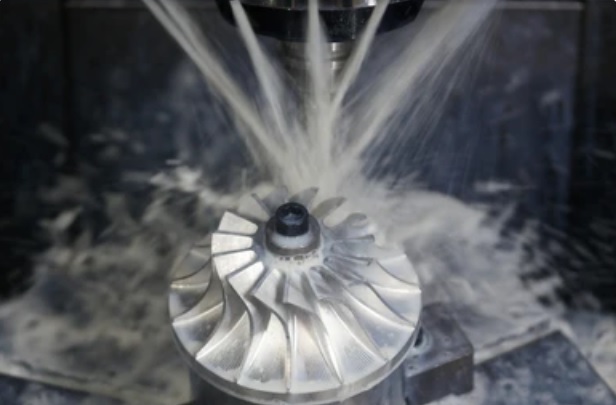In the ever-evolving realm of manufacturing, the two absolute necessities that can make or break anything are efficiency and accuracy. This is especially true for CNC mold making, where even the most minute error or imperfections can have serious consequences.
Nonetheless, now with the availability of a vast array of CNC machines in the market, it can be challenging, exhausting, and time consuming to find and opt for the most suitable CNC machine for mold making.
In this comprehensive guide, we explore CNC machines for mold making, highlight their importance, benefits, and key applications, and understand the essential factors worth considering before selecting your CNC machine.
The CNC (Computer Numerical Control) machine is one of the most groundbreaking technologies to drastically revolutionize the process of mold making. Basically, CNC machining entails the use of automated machines to computerize the manufacturing process.
They are specifically designed to shape and cut an array of materials with unmatched precision, which makes them well-suited for crafting molds with tight tolerances and complex designs.
This accuracy is vital in ensuring superior quality and consistency of precast products across different sectors and industries, from consumer electronics to motorized parts. It is quite evident that labor-intensive processes are quite prone to human error.

However, these machines can be incredibly crucial for this purpose as they can eliminate these variabilities and streamline all your production flows, allowing you to easily meet tight tolerance and specifications.
When it comes to mold making, there are various types of CNC machines, including 3, 4, and 5-axis machines, with each machine providing different degrees of capability and complexity in mold making.
CNC machines have significantly transformed the process of mold-making, thanks to their unmatched versatility, flexibility, repeatability, and accuracy. After all, these machines have come a long way since they were first originated.
Initially, CNC machines that were created in the mid-20th century were designed to control and automate an array of machining operations with superior accuracy. As a result, they have also made their way into the mold industry, which is acquainted with exacting tolerances and complex geometries.
Over the past few decades, developments in materials, hardware, and software have driven this cutting-edge technology to unimaginable heights. This is precisely why CNC machines are truly an asset for mold-making operations in the present.

When it comes to the mold industry, you can expect CNC machine tools to bring about a remarkable difference in various ways.
One of the most CNC machine tool’s striking features is that they are renowned for achieving supreme precision. In mold manufacturing, sometimes even the slightest deviations can result in major defects or inaccuracies in the final product. Suffice it to say, manufacturers cannot compromise on precision.
CNC machines work with accuracy levels that are measured in microns. This ensures that the molds are created to precise specifications. With this kind of precision, the product quality can be significantly enhanced. Moreover, it also helps to optimize efficiency in production and minimize waste.
CNC machine tools delivers excellent efficiency gains in mold production since they work round the clock, with very little downtime. This ultimately results in decreased lead times and faster turnaround for mold fabrication.
CNC technology is seamlessly integrated with CAM and CAD software that permit workflows to be more streamlined and organized, from the design phase to the finished product. This expedites the manufacturing process, optimizes material utilization, and decreases errors.
Unlike traditional methods of machining that are confined by human intervention and fixed tooling, these machines can adopt an array of complex tasks and operations.
Whether it is creating sharp corners, intricate cavities, or complex curves, CNC technology is exceptionally advanced and it allows mold designers to test the boundaries of functionality and creative vision.
This versatility and flexible can be valuable for industries where customization and modernization serve as the key differentiating factors.
Quality control and consistency are imperative in mold manufacturing because they make sure that every mold meets the required specifications. These machine tools are built with hi-tech feedback and monitoring systems that boost quality assurance (QA) throughout the entire process.
Automated tool exchanges, data analytics in real time, and adaptive machining technologies add to sustaining uniformity and tight tolerances across production batches. With this ability, CNC machines tend to decrease rework and scrap, boosting customer satisfaction and product reliability, in general.
The machining of diverse materials and intricate geometries plays a significant part in the mold industry. CNC machine tools surpass in dealing with these challenges. Developed machining strategies like high-speed cutting, multi-axis milling, etc., allow these machines to deal with complex molds with the utmost efficiency and accuracy.
CNC technology also enables manufacturers to use different materials, including exotic alloys and hardened steel, which further broaden the prospects for mold designers.
There is a vast range of CNC machines catered specifically for the mold making process that you can choose from. These include:
● CNC Milling Machines: They have rotary cutters that eradicate the material with the utmost precision, making them generally well-suited for crafting complex and detailed molds.
● CNC Laser Cutters: They incorporate the use of robust, high-powered lasers for elaborate, complex designs and precision cuts.
● CNC Electrical Discharge Machining: They use electrical discharges to form the material’s shape, making them ideal for complex details and hard materials.
● CNC Lathes: They rotate the material against a stationary cutting tool, making them ideal for crafting symmetrical molds.

There are various factors that come into play when looking for the most suitable CNC machine for mold making. For instance, before choosing the right CNC machine, you must ensure it provides optimal precision, quality, and production efficiency.
This requires evaluating an array of factors to make sure the machine is perfectly aligned with the challenging demands of mold making processes. Having said that, let’s explore the key factors worth considering.
CNC machines make sure to provide accurate and precise mold production since it is significant for medical devices and the automotive and aerospace industry.
This is because even a small deviance from the original specifications can result in performance issues or pricey defects.
CNC machines’ precision machining drastically minimize chances of defects and manual modifications while also ensuring consistency and boosting efficiency and productivity.
The axis configuration largely states the ability of a machine to tackle intricate outlines and geometries. While 3-axis CNC machines are prevalent and well-suited for an array of mold-making tasks, 5-axis CNC machines are ideal for this purpose as they offer enhanced precision and require lesser time to configure.

Suffice it to say, CNC machines with cutting-edge axis configurations can efficiently allow manufacturers to streamline workflows and achieve enhanced accuracy. Moreover, these machines provide more significant versatility and liberty to design in mold making.
When the spindle power is high and speed is adjustable, the material cutting and removal process is surely going to be more efficient, resulting in more expedited machining, more polished finishes, and better precision.
Rigidity plays a vital role in preventing deflection during machining while also guaranteeing accurate and stable molds with superior surface finishes.
A rigid machine ensures dimensional firmness all over the machining process and makes sure the features of the mold are reproduced with precision and without any distortions. It further enables faster cycles, greater cutting speeds, and enhanced mold quality.
Compatible software and cutting-edge control systems tend to make the integration and programming simpler, minimizing configuration times and errors. This ultimately results in better accuracy and process optimization.
Automatic tool changers are efficient in minimizing downtime, streamlining workflows, and boosting efficiency. Sufficient tool capacity also gives you the flexibility for distinct mold design and boosts machining precision.
Here are some essential things to consider when using a CNC machine for mold making.
|
Material Selection |
Your choice of material is largely based on the mold’s specific requirements, with some of the most popular choices being steel, aluminum, and various plastics. Each material comprises distinct properties that can have an impact on the final mold’s performance and machining process |
|
Software
|
Use an A-grade CAM or CAD software for accurate and efficient machine operation. Cutting-edge software solutions give you enhanced control over the complete machining process. They also aid in optimizing toolpaths for enhanced performance. |
|
Tooling
|
Different design features and materials call for different cutting tools, so choose the one that suits your requirements best. Your choice of tooling has a significant impact on the cut’s quality, surface finish, and the machining process’s productivity, in general. |
|
Operator Skill
|
Proficient workers play a significant role in running and overseeing the CNC machines to ensure superior results. Moreover, they can detect and tackle potential problems promptly, ensuring overall productivity and efficiency. |
|
Machine Maintenance
|
With routine maintenance, you can go a long way in ensuring your CNC machine’s longevity and optimal performance. Preventative maintenance aids in preventing unanticipated downtime and guarantees consistent quality in mold production. |
There are a plethora of ways you can benefit by using a CNC machine for mold making. Let’s look at the numerous advantages of CNC Machines in mold making:
Once you create a program, you can use CNC machines repeatedly to create identical molds. This consistency can be incredibly valuable for large-scale production runs, where the key objective is to ensure uniformity.
CNC machines are well able to achieve extremely tight tolerances, which is incredibly crucial for superior quality molds. With this accuracy, you can rest assured the final product will meet the precise performance and specifications as you envisioned.
CNC machines do not require any breaks and can work without any interruption, ultimately minimizing production times. This kind of automation reduces cycle times and drastically minimizes the need for humans to intervene and allows for enhanced productivity and efficiency and speedy turnaround times.
Surface finish is the most crucial thing in mold making. This is because poor surface quality can ruin the final product and result in pricey rework.
Fortunately, CNC machines are well-known for having a knack to achieve outstanding surface finishes, which is largely on account of their state-of-the-art machining strategies and top-speed spindles.
From intricate textures to mirror-like finishes, they deliver molds that surpass even the toughest aesthetic standards.
Even though technical finesse and know-how is imperative, it is equally crucial to have user experience. CNC machines are designed while keeping the user in mind, which is why they feature user-friendly interfaces and intuitive controls.
From experienced veterans to newbie operators, it is relatively easy for anyone to quickly learn and master CNC machines and use them for mold making.
CNC machines are also renowned for their ability to seamlessly integrate with industry-standard CAM and CAD software. This enables them to streamline the machining process entirely from the design phase to the manufacturing and production phase.
CNC machines can operate with various materials with ease, from aluminum to steel to plastics. With a reliable CNC machine, mold makers can easily innovate and experiment without any hassle or limitations.
This kind of versatility and flexibility is beneficial in mold making and goes a long way in catering for the manufacturing of molds for diverse industries and applications.
CNC Machines can manage the most elaborate and complex designs that are otherwise challenging or impossible to achieve manually. This capability permits the production of detailed molds with complex features.
The flexibility and versatility of CNC machines allows them to be used in an array of mold-making applications, such as:
● Injection Molding: CNC machines are widely used for making molds for plastic parts in everything from consumer goods, automotive, etc. Injection molds call for the utmost precision to make sure that the final plastic products are free from defects and accurate.
● Die Casting: CNC machines are used for crafting molds for metal components that are quite prevalent in the aerospace and automotive industries. Die casting molds are able to tolerate extreme temperatures and high pressures, which is why they call for sturdy materials and accurate machining.
● Compression Molding: CNC machines are used to create molds for composite components of high strength. Compression molds are utilized for crafting hard-wearing parts in the automotive and aerospace sector.
● Blow Molding: These machines are also used for crafting molds for hollow plastic items such as containers and bottles. Blow molds need to be designed with care to ensure consistent wall width and structural integrity.
CNC mold making truly depicts a vibrant intersection of cutting-edge technology, precision engineering, and manufacturing proficiency. Hence, in order to ensure success and optimal efficiency, it is crucial to opt for the ideal CNC machine for mold making.
Moreover, it is important for manufacturers to consider all the key factors meticulously to make well-informed decisions that optimize their mold-making processes.
A well-rounded approach to choosing CNC machines ensures being able to meet complex designs and tight tolerances. Even though there are various options to choose from, CNC Yangsen provides you the ultimate combination of speed, accuracy, efficiency, versatility, flexibility, and user-friendliness.
Here at CNC Yangsen, we are dedicated to offering top of the line CNC machining services for mold making. Our hi-tech machines and proficient team make sure that every mold we create surpasses the highest standards of quality and accuracy.
Whether you require a prototype or an expansive production, you can rest assured we have the perfect equipment and expertise to cater to your needs.
So, what are you waiting for? Observe yourself gain a competitive advantage after harnessing the power of our state-of-the-art CNC machines and steer your business to the ultimate pinnacle of success.
Visit our website for more information or contact us today to learn how we can support your manufacturing needs and help you accomplish your goals.